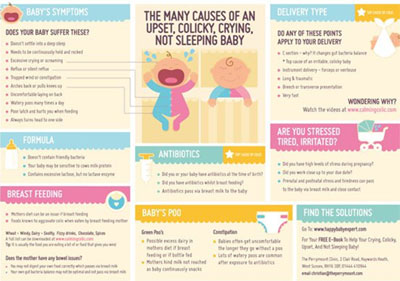Stress in mother passed to baby
Some of the most “colicky” babies I have seen have very stressed parents. Is the stress because of having a colicky baby or was the stress in the mother before the birth of their child? Probably both in many cases. On noticing this I added another cause to my list of colic causes and then I decided to research this. Pasted below is the study that satisfied my theory.
The researchers looked at “fear behaviour” in babies that were breast fed and formula fed. What is “fear behaviour”? I have no idea! But I chose to call it colic. What did they find? Basically the more stress hormones in the mothers milk the more “fear” in the baby. This was not present in the formula fed babies.
My conclusion: Another cause of colic found.
Glynn, L.M., Davis, E.P., Schetter, C.D., Chicz-Demet, A., Hobel, C.J., & Sandman, C.A. (2007). Postnatal maternal cortisol levels predict temperament in healthy breastfed infants. Early Hum Dev, 83(10), 675-681.
Abstract
BACKGROUND:
The implications of the biologically active elements in breast milk for the breastfed infant are largely unknown. Animal models suggest that ingestion of glucocorticoids during the neonatal period influences fear behavior and modifies brain development.
AIMS:
To determine the association between postnatal maternal cortisol levels and temperament in breastfed infants.
STUDY DESIGN:
The relation between maternal cortisol and infant temperament was examined in breastfed and formula-fed infants. Plasma cortisol was used as a surrogate measure for breast milk cortisol levels (plasma and milk levels are correlated in the 0.6 to 0.7 range; [Patacchioli FR, Cigliana G, Cilumbriello A, Perrone G, Capri O, Alemà GS, et al. Maternal plasma and milk free cortisol during the first 3 days of breast-feeding following spontaneous delivery or elective cesarean section. Gynecologic and Obstetric Investigations 1992;34:159-163.]. If exposure to elevated cortisol levels during infancy influences temperament, then a relation between the two should be found among the breastfed infants, but not among the formula-fed infants.
SUBJECTS:
Two hundred fifty-three two-month-old infants and their mothers.
OUTCOME MEASURES:
Fearful temperament assessed with the Infant Behavior Questionnaire [Garstein MR, Rothbart MK. Studying infant temperament via the revised infant behavior questionnaire. Infant Behavior and Development 2003;26:64-86].
RESULTS:
Among the breastfed infants, higher maternal cortisol levels were associated with reports of increased infant fear behavior
Missing text here
CONCLUSIONS:
The findings are consistent with our proposal that exposure to cortisol in breast milk influences infant temperament. Biologically active components in breast milk may represent one avenue through which the mother shapes the development of the human infant during the postnatal period.





No Comments